www.thornwalker.com/ditch/snieg_prefiguration_01.htm
Reprint rights.
This
page © 2005 WTM Enterprises.
Article © 2005 Stephen J.
Sniegoski.
All rights reserved.
To
Part Two
To Part Three
(conclusion)
Gulf War 1991:
Prefiguration and prelude
to the 2003 Iraq
debacle
Part One
By STEPHEN J. SNIEGOSKI
| If you find this essay of value, please send a
donation of $3 to TLD. More information appears below. |
When the Bush I administration fought the Gulf War against Iraq in
1991, with a bombing campaign and brief ground invasion, the American
people were in ecstasy over a victory that was quick and (at least for
Americans) largely bloodless. And unlike the case with Bush II's
war, the United States was able to escape seemingly unscathed at the
time. But the similarities between the two wars outweigh the
differences, and the Gulf War of 1991 can be seen as both a prefiguration
and a prelude to the American war on Iraq of 2003. An understanding of
the earlier war can provide the observer with a good standard of reference
with which to analyze the war of 2003.
To understand the significance of the Gulf War of 1991 it is necessary to
look briefly at the policy of the United States toward the Middle East
during the latter stages of the Cold War.
The watchword for American policy was stability, which was perceived as
a fundamental prerequisite for maintaining the vital flow of oil to the
West. In its quest for stability in the Middle East, the post-World War II
United States supported the conservative monarchies of Saudi Arabia and
the Gulf sheikdoms, and opposed radical elements that threatened to
disturb the status quo. In the 1970s, Washington feared that Baathist Iraq,
under the banner of Arab nationalism and socialism, threatened the
conservative Gulf states. In 1972, Iraq formalized its close ties with the
Soviet Union, signing a 15-year treaty of friendship and cooperation and
becoming a recipient of Soviet armaments. Consequently, during the
1970s, the United States backed the Shah's Iran as the protector of the
weak Arab monarchies and guardian of stability in the Gulf. Washington
became a major arms provider to the Shah's government,
offering it almost anything it could purchase, short of nuclear weapons. [1]
With the overthrow of the Shah in early 1979 and the establishment of the
Islamic Republic, American policy was forced to change. Now the United
States identified revolutionary Shi'ite Islamism directed by the Ayatollah
Khomenei as the foremost threat to the stability of the Middle East. When
Saddam launched an attack on Iran in 1980, Washington saw it as a move
that would serve to rein in the Iranian revolutionary threat.
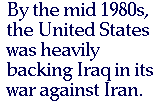 American policy would soon begin to tilt toward supporting Iraq.
Washington removed Iraq from its list of terrorist states in 1982 and, in
1984, restored diplomatic relations, which had been severed in 1967.
Ironically, Donald Rumsfeld, serving as a special envoy, paved
the way for the restoration of relations in a December 1983 visit to Iraq.
[2]
American policy would soon begin to tilt toward supporting Iraq.
Washington removed Iraq from its list of terrorist states in 1982 and, in
1984, restored diplomatic relations, which had been severed in 1967.
Ironically, Donald Rumsfeld, serving as a special envoy, paved
the way for the restoration of relations in a December 1983 visit to Iraq.
[2]
In the fall of 1983, a National Security Council study determined that Iran
would very likely defeat Iraq, an outcome which was considered a major
catastrophe for American oil interests in the Gulf. Consequently, the
United States would have to provide sufficient assistance to
Iraq to prevent that risk from materializing. [3]
Thus, by the mid 1980s, the United States was heavily backing Iraq
in its war against Iran, although for a time the United States also
provided limited aid to Iran (under an arrangement that came to light as
the Iran-Contra scandal). American help for Iraq included battlefield
intelligence, military equipment, and agricultural credits. And Washington
deployed in the Gulf the largest naval force it had assembled since the Vietnam War, ostensibly to protect oil tankers but
actually to mount major attacks on Iran's navy. [4]
During the period when the United States
was providing aid to Iraq, numerous reports documented Iraq's use of
chemical weapons against the Iranians. Washington was opposed, in
principle, to the use of poisonous gas, which was banned by the Geneva
Protocol of 1925. But the Reagan administration considered that legal and
moral issue of secondary importance compared with the
pressing need to prevent an Iranian victory. [5]
In fact, U.S. satellite intelligence facilitated Iraqi gas attacks against
Iranian troop concentrations. Moreover, Washington allowed Iraq to
purchase poisonous chemicals and even strains of anthrax and bubonic
plague from American companies; and in 1994 those substances were identified as key components of the Iraqi biological
warfare program in an investigation conducted by the Senate Banking
Committee. [6] The exports of those biological agents continued until
November 28, 1989, if not later. [7]
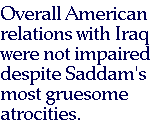 In late 1987, the Iraqi air force began using chemical agents against
Kurdish resistance forces in northern Iraq, as the Kurds had formed a
loose alliance with Iran. The attacks, which were part of a "scorched
earth" strategy to eliminate rebel-controlled villages, provoked outrage in
Congress, and in 1988 the Senate Foreign Relations Committee called for
sanctions to be imposed on Iraq affecting $800 million in guaranteed
loans. The State Department did issue a condemnation of the gassing of
the Kurds at Halabja in 1988, but overall American relations with Iraq
were not impaired despite Saddam's most gruesome atrocities, accounts
of which were being widely disseminated by numerous
international human-rights groups. [8]
In late 1987, the Iraqi air force began using chemical agents against
Kurdish resistance forces in northern Iraq, as the Kurds had formed a
loose alliance with Iran. The attacks, which were part of a "scorched
earth" strategy to eliminate rebel-controlled villages, provoked outrage in
Congress, and in 1988 the Senate Foreign Relations Committee called for
sanctions to be imposed on Iraq affecting $800 million in guaranteed
loans. The State Department did issue a condemnation of the gassing of
the Kurds at Halabja in 1988, but overall American relations with Iraq
were not impaired despite Saddam's most gruesome atrocities, accounts
of which were being widely disseminated by numerous
international human-rights groups. [8]
"The U.S.-Iraqi relationship is ... important to our long-term political and
economic objectives," wrote Assistant Secretary of State Richard W.
Murphy in a September 1988 memorandum addressing the chemical-weapons question. "We believe that economic sanctions will be useless or
counterproductive to influence the Iraqis." [9] In short, the
United States was fundamentally concerned about maintaining stability in
the Gulf region, which took precedence over any humanitarian issue. The
irony of it all is that, despite clearly realizing the implications of what it
was doing, the United States helped arm Iraq with the very weapons of
horror that Bush II administration officials in 2002-2003 trumpeted as justification for forcibly removing Saddam from
power.
While the United States was supporting Iraq, Israel was providing war
materiel to Iran — a significant illustration of how Israeli policy
had diverged from that of the United States. Israel's support of Iran
reflected the long-held Israeli policy of supporting the periphery of the Middle Eastern world against Israel's closer neighbors. [10]
After the Iran/Iraq war ended in August
1988 with an inconclusive ceasefire, Iraq's development and
use of chemical weapons evoked increasing criticism in the United States,
especially in Congress. By November 1988 both houses of Congress had
passed legislation that would have had the effect of imposing sanctions on
Iraq.
Congress's efforts to sanction Iraq, however, were countered by the
administration of George H.W. Bush, which came into office in January
1989. The Bush administration essentially continued the Reagan regime's
favorable treatment of Iraq, showering it with military hardware,
advanced technology, and agricultural credits. Washington apparently
looked to Saddam to maintain stability in the Gulf, and
believed that trade and credits would have a moderating effect on him. [11]
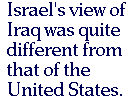 Israel's view of Iraq was quite different from that of the United States.
Israel looked upon Iraq's military buildup as a dire threat to its military
supremacy in the Middle East. For it appeared that Iraq was developing the capability to counter, at least to a degree,
Israel's superior arsenal of conventional, chemical, and nuclear arms. [12] As Dan Raviv
and Yossi Melman observed in April 1990: "The Israelis say that, whatever
they have, they must ensure it is far more powerful than
anything the Arabs may get." [13]
Israel's view of Iraq was quite different from that of the United States.
Israel looked upon Iraq's military buildup as a dire threat to its military
supremacy in the Middle East. For it appeared that Iraq was developing the capability to counter, at least to a degree,
Israel's superior arsenal of conventional, chemical, and nuclear arms. [12] As Dan Raviv
and Yossi Melman observed in April 1990: "The Israelis say that, whatever
they have, they must ensure it is far more powerful than
anything the Arabs may get." [13]
Israel could conceivably destroy the budding Iraqi arsenal through a
preemptive strike, but such an attack would have serious drawbacks.
"Eliminating the technological capacity of Iraq, as in 1981, is becoming
impractical," said Gerald Steinberg, a military expert at
Bal-Ilan University in Tel Aviv. "The potential costs of it have gone up, and
the effectiveness is diminished each time it is done." [14] Nonetheless, Israel began making secret preparations to attack
Iraq's chemical-weapons plants. [15]
By the beginning of 1990, tensions in the Middle East had begun to
escalate. On March 15, Iraq hanged a British Iranian-born journalist,
Farzad Bazoft, claiming he was a spy for Iran and Israel, and Great Britain
recalled its ambassador to Baghdad the following day. On March 22, Gerald
Bull, a Canadian ballistics expert who provided engineering assistance to
Iraq to develop long-range artillery — especially a so-called super-gun that could reach Israel — was murdered in Brussels, and agents
of the Israeli Mossad were suspected in that crime. On March 28, the
British arrested five men, charging them with attempting to smuggle
American-made nuclear bomb triggers to Iraq. Two days later, the New
York Times published a U.S. intelligence report confirming that Iraq had deployed six SCUD missile launchers to the western
regions of the country, putting Tel Aviv within range. [16]
Fearing that Israel may have been planning an air raid similar to the one it
conducted against Iraq's nuclear reactor at Osirak in 1981, Saddam
Hussein in early April 1990 announced that if Israel attacked Iraq, he
would drench half of Israel with chemical weapons. The Western media
portrayed Saddam's threat as outrageous, often omitting the defensive
context of his warning. In response to Saddam's speech, Ehud Barak,
Israel's chief of staff, asserted that Israel would strike at
Iraq any time its forces became a threat to Israel. [17]
Angering Israel and its American supporters
further was the Bush I administration's effort to
rekindle the Middle East peace process. The Palestine Liberation
Organization, which had recognized Israel in 1988, seemed more willing to
negotiate than the Israeli government headed by Likud Prime Minister
Yitzhak Shamir, which was resistant to giving up control of the occupied
territories. Shamir insisted on January 14, 1990, that the influx of
Soviet Jews necessitated Israel's retention of the West Bank. On
March 1, 1990, Secretary of State James Baker stipulated that
American loan guarantees to Israel for new housing for the Soviet
immigrants hinged on the cessation of settlements in the occupied
territories. And on March 3, President Bush adamantly declared that
there should be no more settlements in the West Bank or in East
Jerusalem.
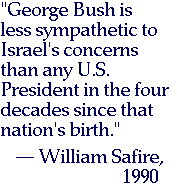 But Shamir rejected, forthwith and openly, the Bush administration's
entire effort to bring about a solution. And Israel's
American supporters, especially on the Right, were thoroughly on the side
of the Israeli prime minister. [18] William
Safire, a pro-Israel columnist for the New York Times, complained that
"George Bush is less sympathetic to Israel's concerns than any U.S.
President in the four decades since that nation's birth." Safire continued:
"Mr. Bush has long resisted America's special relationship with Israel. His
Secretary of State, James Baker, delights in sticking it to the Israeli
right. His national security adviser, Brent Scowcroft, and chief of staff,
John Sununu, abet that mind-set."
But Shamir rejected, forthwith and openly, the Bush administration's
entire effort to bring about a solution. And Israel's
American supporters, especially on the Right, were thoroughly on the side
of the Israeli prime minister. [18] William
Safire, a pro-Israel columnist for the New York Times, complained that
"George Bush is less sympathetic to Israel's concerns than any U.S.
President in the four decades since that nation's birth." Safire continued:
"Mr. Bush has long resisted America's special relationship with Israel. His
Secretary of State, James Baker, delights in sticking it to the Israeli
right. His national security adviser, Brent Scowcroft, and chief of staff,
John Sununu, abet that mind-set."
Safire was outraged that Bush should threaten to abstain from abetting
the Israeli government's colonization of the occupied West Bank. "This is
the first Administration to openly threaten to cut aid to Israel," he wrote.
"... This is also the first Administration to tie aid directly to Israel's
willingness to conform to U.S. policy demands: unless the West Bank is
barred to Jews who want to move there, no loans will be guaranteed to
help Soviet Jews start new lives." Safire claimed that Jewish settlement
of the West Bank was essential for Jewish Russian immigrants because, he alleged, a resurgence of anti-Semitic
pogroms was imminent in post-Communist Russia. [19]
The U.S. media, especially the pro-Israel media, was reporting that Iraq
was producing nuclear materials, developing chemical weapons, and
producing guided missiles. For example, U.S. News and World Report, owned
by Zionist Mortimer Zuckerman, titled its June 4,
1990, cover story about Saddam "The World's Most Dangerous Man." [20] The Bush
administration, however, firmly resisted efforts to alter its friendship to
Iraq.
Reacting to congressional protests of Saddam's threat to use chemical
weapons against Israel, Secretary Baker correctly noted the defensive
context of the threat in testimony before the Senate appropriations
subcommittee on April 25, 1990, and even went so far as to insinuate that
it was appropriate for Iraq to have such weapons as a defensive deterrent.
Baker said that while the Bush administration regarded the use of
chemical weapons as "disturbing," Saddam only threatened to use "chemical weapons on the assumption that Iraq would have
been attacked by nuclear weapons." [21]
What ultimately led to the Bush I
administration's break with Iraq, of course, was its
aggressive move on the tiny sheikdom of Kuwait. Saddam's desire to
control Kuwait was not unique for an Iraqi leader. Iraqis had long regarded
Kuwait as a rightful part of their national domain. In 1963, in fact, Iraq's
president had asserted an Iraqi claim to Kuwait, only to back down when
the British deployed a detachment of regular troops in the emirate. What
especially caused Saddam to look longingly toward Kuwait and its oil was
Iraq's dire economic situation. Iraq's victory over Iran had been a Pyrrhic
one, leaving the country economically devastated with an enormous debt
of tens of billions of dollars — Saddam admitted to $40 billion.
Significant portions of the debt were owed to Arab oil-producing
neighbors — Saudi Arabia and Kuwait. To pay off the debt, Iraq would
have to rely on its oil production, but much of Iraq's oil-producing
capacity in the southern part of the country had been
destroyed in the war. Moreover, the price of oil had plummeted. [22]
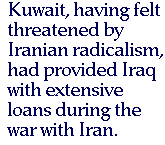 Kuwait seemed a reasonable scapegoat for Iraq's problems, and it
simultaneously offered a solution. Kuwait, having felt threatened by
Iranian radicalism, had provided Iraq with extensive loans during the war
with Iran. With the end of the war, however, the Kuwaiti government
demanded full repayment from Iraq, whereas Iraq expected Kuwait to
write off its debt as a reward for its providing protection from Iran.
Moreover, Kuwait continued to flagrantly exceed its OPEC production
quota, overproducing by 40 percent, which helped depress the oil
prices that Iraq desperately needed elevated. Saddam also accused Kuwait
of siphoning off oil from the Iraq section of their shared Rumaila oil field
through slant drilling and demanded a revision of the territorial boundary with Kuwait to favor Iraq. [23]
Kuwait seemed a reasonable scapegoat for Iraq's problems, and it
simultaneously offered a solution. Kuwait, having felt threatened by
Iranian radicalism, had provided Iraq with extensive loans during the war
with Iran. With the end of the war, however, the Kuwaiti government
demanded full repayment from Iraq, whereas Iraq expected Kuwait to
write off its debt as a reward for its providing protection from Iran.
Moreover, Kuwait continued to flagrantly exceed its OPEC production
quota, overproducing by 40 percent, which helped depress the oil
prices that Iraq desperately needed elevated. Saddam also accused Kuwait
of siphoning off oil from the Iraq section of their shared Rumaila oil field
through slant drilling and demanded a revision of the territorial boundary with Kuwait to favor Iraq. [23]
In their War in the Gulf, 1990-91, historians Majid Khadduri and
Edmund Ghareeb, assessing the responsibility for Gulf War I, assign
some culpability to Kuwait for its unwillingness to even consider Iraq's
proposals, which were not totally unreasonable. "Settlement of the crisis
by Arab peaceful means," they maintain, "would have been
much less costly to the Arab world than by foreign intervention." [24] In the long run,
it would have been less costly for the United States, too.
At the end of May 1990, at an Arab summit meeting in Baghdad, Saddam
Hussein threatened to retaliate against Kuwait if it continued to exceed
oil-production quotas. On July 17, 1990, a belligerent Saddam accused
Kuwait and the United Arab Emirates of being "imperialist agents" whose
policy of keeping oil prices low was a "poison dagger" in Iraq's back. Shortly thereafter, Saddam began to move his
military forces toward the Kuwaiti border. [25]
Saddam's critics expressed outrage. Neoconservative Charles Krauthammer
compared Saddam to Hitler. "What makes him truly Hitlerian is his way of
dealing with neighboring states," Krauthammer asserted in the Washington
Post on July 27. "In a chilling echo of the '30s, Iraq, a regional
superpower, accuses a powerless neighbor of a 'deliberate policy of
aggression against Iraq,' precisely the kind of absurd
accusation Hitler lodged against helpless Czechoslovakia and Poland as a
prelude to their dismemberment." [26]
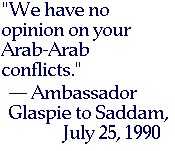 The Bush administration, however, seemed quite indifferent to the
imminent Iraqi threat to Kuwait. In a press conference on July 24, State
Department spokesperson Margaret Tutwiler did express moral opposition
to "coercion and intimidation in a civilized world," but pointed out that
"we do not have any defense treaties with Kuwait, and there are no special
defense or security commitments to Kuwait." On July 25, Saddam Hussein
summoned U.S. Ambassador April Glaspie to a meeting that would later
gain great publicity and vociferously complained that Kuwait was
engaging in acts of war against Iraq by not assisting with Iraq's war debt
or agreeing to limit its production of oil. If Iraq attacked Kuwait, Saddam
vehemently argued that it would be because Kuwait was already making
war on Iraq. To Saddam's overt threat, Glaspie mildly responded: "We have
no opinion on your Arab-Arab conflicts." It has been widely argued that
Glaspie's response persuaded Saddam that the United States
would not militarily oppose his invasion. He had been given the green light
to attack. [27]
The Bush administration, however, seemed quite indifferent to the
imminent Iraqi threat to Kuwait. In a press conference on July 24, State
Department spokesperson Margaret Tutwiler did express moral opposition
to "coercion and intimidation in a civilized world," but pointed out that
"we do not have any defense treaties with Kuwait, and there are no special
defense or security commitments to Kuwait." On July 25, Saddam Hussein
summoned U.S. Ambassador April Glaspie to a meeting that would later
gain great publicity and vociferously complained that Kuwait was
engaging in acts of war against Iraq by not assisting with Iraq's war debt
or agreeing to limit its production of oil. If Iraq attacked Kuwait, Saddam
vehemently argued that it would be because Kuwait was already making
war on Iraq. To Saddam's overt threat, Glaspie mildly responded: "We have
no opinion on your Arab-Arab conflicts." It has been widely argued that
Glaspie's response persuaded Saddam that the United States
would not militarily oppose his invasion. He had been given the green light
to attack. [27]
Then, on July 31, 1990, Assistant Secretary of State for Near Eastern and
South Asian Affairs John Kelly, in testimony before the House
Subcommittee on Europe and the Middle East, pointed out that the United
States had no defense treaty relationship with Kuwait or other Persian
Gulf countries. Subcommittee chairman Lee Hamilton (D-Ind.) pressed
Kelly for specifics: "If Iraq, for example, charged across the border into
Kuwait, for whatever reasons, what would be our position with regard to
the use of U.S. forces?" Kelly responded: "That, Mr. Chairman, is a
hypothetical or a contingency, the kind of which I can't go into. Suffice it
to say we would be extremely concerned, but I cannot get into the realm of
'what if' answers." Hamilton pressed further: "In that circumstance, it is
correct to say, however, that we do not have a treaty commitment which
would obligate us to engage U.S. forces?"
 "That is correct." Kelly responded. [28]
"That is correct." Kelly responded. [28]
On August 1, the very eve of the Iraqi invasion of Kuwait, the Bush
administration approved the sale of advanced data-transmission devices
to Iraq, which could be used for missiles. The Bush administration offered no hint that it would oppose an Iraqi invasion of
Kuwait militarily. [29].
February 18, 2005
To Part Two.
© 2005 Stephen J. Sniegoski. All rights reserved.
This page © 2005 WTM Enterprises. All rights
reserved.
If you found this article to be interesting, please donate to our cause. You should make your check or m.o. payable in U.S. dollars to WTM
Enterprises and send it to:
WTM Enterprises
P.O. Box 224
Roanoke, IN 46783
Thanks for helping to assure a future for TLD!
Notice to visitors who came
straight to this document from off site: You are deep in The Last Ditch. You
should check out our home page and table
of contents.
 American policy would soon begin to tilt toward supporting Iraq.
Washington removed Iraq from its list of terrorist states in 1982 and, in
1984, restored diplomatic relations, which had been severed in 1967.
Ironically, Donald Rumsfeld, serving as a special envoy, paved
the way for the restoration of relations in a December 1983 visit to Iraq.
[2]
American policy would soon begin to tilt toward supporting Iraq.
Washington removed Iraq from its list of terrorist states in 1982 and, in
1984, restored diplomatic relations, which had been severed in 1967.
Ironically, Donald Rumsfeld, serving as a special envoy, paved
the way for the restoration of relations in a December 1983 visit to Iraq.
[2] In late 1987, the Iraqi air force began using chemical agents against
Kurdish resistance forces in northern Iraq, as the Kurds had formed a
loose alliance with Iran. The attacks, which were part of a "scorched
earth" strategy to eliminate rebel-controlled villages, provoked outrage in
Congress, and in 1988 the Senate Foreign Relations Committee called for
sanctions to be imposed on Iraq affecting $800 million in guaranteed
loans. The State Department did issue a condemnation of the gassing of
the Kurds at Halabja in 1988, but overall American relations with Iraq
were not impaired despite Saddam's most gruesome atrocities, accounts
In late 1987, the Iraqi air force began using chemical agents against
Kurdish resistance forces in northern Iraq, as the Kurds had formed a
loose alliance with Iran. The attacks, which were part of a "scorched
earth" strategy to eliminate rebel-controlled villages, provoked outrage in
Congress, and in 1988 the Senate Foreign Relations Committee called for
sanctions to be imposed on Iraq affecting $800 million in guaranteed
loans. The State Department did issue a condemnation of the gassing of
the Kurds at Halabja in 1988, but overall American relations with Iraq
were not impaired despite Saddam's most gruesome atrocities, accounts
 Israel's view of Iraq was quite different from that of the United States.
Israel looked upon Iraq's military buildup as a dire threat to its military
supremacy in the Middle East. For it appeared that Iraq was
Israel's view of Iraq was quite different from that of the United States.
Israel looked upon Iraq's military buildup as a dire threat to its military
supremacy in the Middle East. For it appeared that Iraq was  But Shamir rejected, forthwith and openly, the Bush administration's
entire effort to bring about a solution.
But Shamir rejected, forthwith and openly, the Bush administration's
entire effort to bring about a solution.  Kuwait seemed a reasonable scapegoat for Iraq's problems, and it
simultaneously offered a solution. Kuwait, having felt threatened by
Iranian radicalism, had provided Iraq with extensive loans during the war
with Iran. With the end of the war, however, the Kuwaiti government
demanded full repayment from Iraq, whereas Iraq expected Kuwait to
write off its debt as a reward for its providing protection from Iran.
Moreover, Kuwait continued to flagrantly exceed its OPEC production
quota, overproducing by 40 percent, which helped depress the oil
prices that Iraq desperately needed elevated. Saddam also accused Kuwait
of siphoning off oil from the Iraq section of their shared Rumaila oil field
through slant drilling and demanded a revision of the
Kuwait seemed a reasonable scapegoat for Iraq's problems, and it
simultaneously offered a solution. Kuwait, having felt threatened by
Iranian radicalism, had provided Iraq with extensive loans during the war
with Iran. With the end of the war, however, the Kuwaiti government
demanded full repayment from Iraq, whereas Iraq expected Kuwait to
write off its debt as a reward for its providing protection from Iran.
Moreover, Kuwait continued to flagrantly exceed its OPEC production
quota, overproducing by 40 percent, which helped depress the oil
prices that Iraq desperately needed elevated. Saddam also accused Kuwait
of siphoning off oil from the Iraq section of their shared Rumaila oil field
through slant drilling and demanded a revision of the  The Bush administration, however, seemed quite indifferent to the
imminent Iraqi threat to Kuwait. In a press conference on July 24, State
Department spokesperson Margaret Tutwiler did express moral opposition
to "coercion and intimidation in a civilized world," but pointed out that
"we do not have any defense treaties with Kuwait, and there are no special
defense or security commitments to Kuwait." On July 25, Saddam Hussein
summoned U.S. Ambassador April Glaspie to a meeting that would later
gain great publicity and vociferously complained that Kuwait was
engaging in acts of war against Iraq by not assisting with Iraq's war debt
or agreeing to limit its production of oil. If Iraq attacked Kuwait, Saddam
vehemently argued that it would be because Kuwait was already making
war on Iraq. To Saddam's overt threat, Glaspie mildly responded: "We have
no opinion on your Arab-Arab conflicts." It has been widely argued that
Glaspie's response persuaded
The Bush administration, however, seemed quite indifferent to the
imminent Iraqi threat to Kuwait. In a press conference on July 24, State
Department spokesperson Margaret Tutwiler did express moral opposition
to "coercion and intimidation in a civilized world," but pointed out that
"we do not have any defense treaties with Kuwait, and there are no special
defense or security commitments to Kuwait." On July 25, Saddam Hussein
summoned U.S. Ambassador April Glaspie to a meeting that would later
gain great publicity and vociferously complained that Kuwait was
engaging in acts of war against Iraq by not assisting with Iraq's war debt
or agreeing to limit its production of oil. If Iraq attacked Kuwait, Saddam
vehemently argued that it would be because Kuwait was already making
war on Iraq. To Saddam's overt threat, Glaspie mildly responded: "We have
no opinion on your Arab-Arab conflicts." It has been widely argued that
Glaspie's response persuaded 